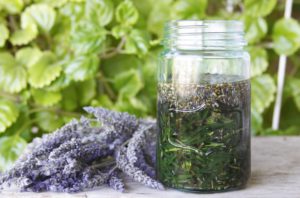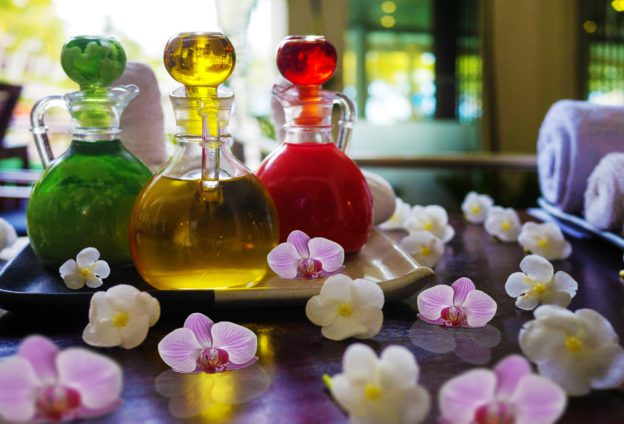There is so much information I could write when it comes to the discussion of fibromyalgia and aromatherapy, and I tried to cover as much as I could in this blog post. I’m sure you have a favorite scent. Maybe it’s the fresh aroma of cucumber? Or the sweet smell of vanilla, perhaps? Not only do we love beautiful scents, but certain odors can even bring back memories and emotions. Ever smell fresh baked cookies, for example and suddenly find yourself reminiscing about a time spent at grandma’s house when you were a child?

This recollection of certain odors is a phenomenon known as olfactory memory, aptly named after the olfactory bulb which runs from the nose to the brain and is closely connected to the hippocampus and amygdala which are strongly linked to emotion and memory. In fact according to an article in Psychology Today, a number of behavioural studies have demonstrated that smells trigger more vivid emotional memories and are better at inducing the feeling of “being brought back in time” than images. But there is a lot more to aromatherapy then just inhaling pleasant scents and it may help to know a little about what aromatherapy is before knowing how it can be used to help improve fibromyalgia symptoms.
What Is Aromatherapy?
Aromatherapy consists of the application of essential oils. Essential oils are volatile plant oils that can be extracted from the seeds, leaves, bark or stems of a plant. They have concentrated aromas and are designed to help prevent and treat various ailments and disease and promote overall health and well being. Aromatherapy takes a holistic approach to healing the body than more conventional treatments you may see today. Holistic refers to treating the whole person (body, mind and spirit) rather than just the symptoms of illness.
How Does Aromatherapy Work?
Its always best first to meet with a credible aromatherapist who is trained in the art and science of aromatherapy. There are different ways to enjoy the benefits of essential oils. When breathing these oils into our lungs, they can offer very positive psychological as well as physical benefits. Many people for example inhale eucalyptus for relief from congestion when they have a sinus cold. Fibromyalgia patients often suffer with depression and this may be a great for lifting one’s mood.
When applied topically, they are quickly absorbed into the skin and enter the bloodstream; afterwards they are carried throughout the entire body. Undiluted essential oils however, are very concentrated and powerful and should never be applied directly to the skin. Essential oils are usually diluted in a carrier first such as coconut oil, olive oil, avocado oil, or other cold pressed vegetable oil before being applied to the skin.

Add aromatherapy oils to your bath water and relax
Essential oil can also be added to bath water for a relaxing spa-like experience at home. One of the best way to use these oils though, is in combination with massage therapy, If this is not too painful. This way you get to enjoy the many health and relaxation benefits of both the message and the oil. Essential oils can also be used around the home to make the air smell beautiful and inviting, or in dresser drawers to help linen and clothes smell fresh and clean longer.
Because of the recent increase in popularity of essential oils, there is always new information coming out online about different ways to use them, including ingestion. Some believe, for example grape fruit oil in water will help with weight loss or peppermint oil in water to aid indigestion, a common fibromyalgia complaint. This however is not recommended by most professionals in the field. If you are interested in taking essential oils by mouth, you should always first consult a physician.
When used correctly and safely, these essential oils can be great for relaxation and helping minimize some of the worse symptoms of fibromyalgia. They are useful in alleviating stress, help sore achy muscles or naturally induce sleep. When absorbed by the skin some of them can also help with circulation and encourage the body to release toxins. Almost all essential oils have antiseptic properties as well and have the ability to fight against infections, fungi, bacteria, parasites, yeast and even viruses. It’s easy to see why aromatherapy is one of the most popular complementary therapies used today.
My Top 3 Favorite Essential Oils for Fibromyalgia And Why
Lavender Oil (Lavendula angustifolia)

Lavender comes from a herb, is one of the most versatile oils and has a wonderfully soothing scent. Lavender oil should only be applied topically or inhaled and never ingested. Lavender essential oil can help with many fibromyalgia related health complaints, including insomnia, anxiety, depression, stress, headaches, sinus congestion, backaches, joint pain and can relax sore muscles.
It can also be used as an insect repellent, treat hair loss, laryngitis and improve blood circulation. It is commonly used as a fragrance in soaps, perfumes, deodorants, lotions and other pharmaceutical products. Lavender is not recommended however for diabetics and/or pregnant or breastfeeding woman.
Eucalyptus oil (Eucalyptus Globulus)

Eucalyptus is extracted from the dry leaves of the eucalyptus tree. When taken by mouth, eucalyptus oil can be used as an expectorant to loosen coughs. The vapor can also be inhaled and used to treat sinus pain and congestion, inflammation, respiratory infections and when gargled, may help to reduce dental plaque. The antiseptic properties of eucalyptus also make it great for applying to wounds, burns and acne.
For fibromyalgia patients who suffer from aches and pains, you can add eucalyptus oil to bathwater for a wonderful aroma and for massage to help with sore tense muscles as well as arthritic pain. You will find eucalyptus in many household items, including toothpaste, mouthwash, cough drops, lozenges and beauty products. Eucalyptus oil should always be diluted in a carrier before it’s used and should not be taken by mouth unless under a doctor’s supervision. This oil should never be used by young children, and avoid it if you are pregnant or nursing a baby.
Ylang Ylang (Cananga Odorata)

Ylang ylang is pronounced ee-lang ee-lang, comes from a flower and has a delicate floral fragrance. Ylang ylang is probably best known for it’s “mood lifting” antidepressant qualities. Not only can it fight depression when breathed in, it also promotes a feeling of relaxation, soothes anxiety and melts away stress. This can be a very helpful and powerful tool for people who have fibromyalgia.
This essential oil has also been known to increase libido, decrease blood pressure, strengthen the nervous system and even has the ability to prevent and cure certain types of infections. What’s not to like about it right? Because of its beautiful aroma, this essential oil is use in many perfumes, lotions cosmetics and bath products as well. Like most essential oils, you should avoid it if pregnant or nursing. Ylang ylang is also wonderful when combined with sandalwood, grape fruit and lavender oil. Is it any wonder why this wonderful, versatile oil is becoming so popular with aromatherapists these days?
Don’t Forget About These Other Great Oils.
Of course there are many more great essential oils to explore. Essential oils that are known for their amazing antibacterial properties include peppermint, lemongrass, bergamot, oregano, thyme, clove, basil, rosemary, lavender, eucalyptus, cinnamon and tea tree oil.
For relaxation and stress relief, you can try lavender, tangerine, orange, ylang ylang, rose, geranium, frankincense, bergamot, spearmint, sweet marjoram or calary sage.
If you want to feel more energized in the morning, or anytime, particularly if you are a little under the weather that day try one or more of these: grapefruit, lemon, clove, basil, lemongrass, eucalyptus, peppermint, orange, lavandin, and rosemary.
If what you are looking for is a good nights sleep, you may want to use vetiver, lavender, ylang ylang, sandalwood, marjoram, jasmine, cedar wood, roman chamomile or bergamot. Essential oils are often great combined with other essential oils as well.
Is Therapeutic Grade Oil Superior?
Many companies use the terms “therapeutic grade” or “aromatherapy grade” or “grade A” however these terms hold very little significance. Unfortunately there is no governmental agency/organization in the US or Canada that certifies or grades essential oils. You will find that most, if not all companies that sell essential oils claim that theirs is “therapeutic grade” or something similar, but a grading system simply does not exist.

Just because a company claims their product is of a certain quality or grade does not necessarily mean the company cannot be trusted either, it’s just not a good indication as to the quality of the oil. Your best bet is to talk to an aromatherapist, herbalist or other expert first and find out what they recommend. You may also want to visit the National Association of Holistic Aromatherapy at naha.org and the Canadian Foundation of Aromatherapists at cfacanada.com for more information on aromatherapy, education and/or how to find a qualified aromatherapist in your area.
Give It A Try!
I hope this blog on fibromyalgia and aromatherapy has inspired you enough to give essential oils a try. Perhaps at the very least it has given you a somewhat better understanding of what aromatherapy is and all the wonderful potential benefits of essential oils. Aromatherapy is still fairly new and sometimes misunderstood. However, It has been growing tremendously in popularity over the last few years. I have no doubt, this is partly due to the fact that individuals are starting to give alternative therapies in general more consideration. But also because people especially those with fibromyalgia are discovering the many health and relaxation benefits of essential oils and how it can potentially improve many of their symptoms…naturally.

Fibromyalgia and Aromatherapy is a really new thing for me. I had no idea or whatsoever about it before reading this article today. I’m glad I found this article because this article had everything I needed to know about Fibromyalgia and Aromatherapy. It had great explanations about it.
Thank you for posting this. The article was easy to read and understand.
Yes, aromatherapy with respect to fibromyalgia is a fairly new topic. Thanks for your comment.